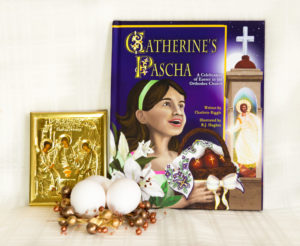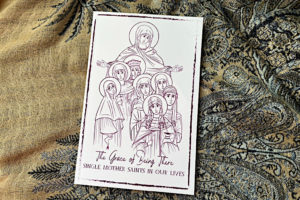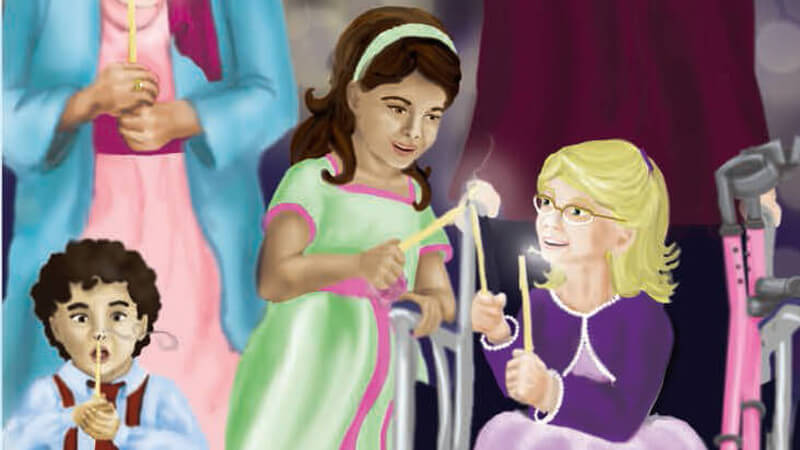Most children love the idea of a celebration that takes place in the middle of the night! But their parents, who are already tired by the time the Pascha service begins at midnight, may wonder how to attend with peace and joy, instead of frustration and tears. Especially if their children have disabilities.
It’s important to have realistic expectations. Children are children, even on Pascha. Many children will behave more appropriately if they know what to expect. Review the service with them during the day on Holy Saturday. You can watch videos of Pascha services, or read a Pascha story like Catherine’s Pascha. Point out to your child things that will be the same at your parish, and things that will be different.
Tips from the Family Pascha Guide
Deacon Mark Oleynik of Holy Trinity Orthodox Church, State College, PA, has prepared a Family Pascha Guide with ideas and suggestions to help parents guide their children through the services of Holy Friday, Holy Saturday, and Pascha.
Here are his parenting tips for Pascha. His suggestions are good for all children, and a good starting point for families with disabilities:
- Although it may be difficult, try to get your child to rest or take a nap on Saturday. Every kid wants to stay up late…this is their big chance!
- Dress your child warmly and perhaps bring a blanket to wrap them in to keep the chill away.
- Younger children will probably fall asleep at some point—this is to be expected. They will still probably remember many things about the night.
- “Gently” rouse your child for communion several minutes before they will receive the Body and Blood.
- Teach your children the Paschal greeting (Christ is Risen! Indeed He is Risen!) in different languages. They will like to respond out loud to these greetings—especially in church.
You’ll notice, when you read Catherine’s Pascha, that Catherine’s parents do all of these things!
When the midnight service isn’t possible
Children with certain medical conditions need to eat and sleep on a regular schedule, even on Pascha. Some children simply don’t have the stamina to manage the midnight service. Some can’t cope with crowds of people, loud noises, or changes in their routine.
If your child can’t attend the Pascha service in the middle of the night, that’s hard for your family, and it’s hard for you. But life with disabilities is what it is. Here are some things that might work for you.
- Don’t try to do too much during Holy Week. Make sure your child is getting enough sleep, and doesn’t become overtired before Pascha.
- Instead of going to the midnight service, attend the Holy Saturday liturgy with your child, or Agape Vespers. Maybe both, if your child is up to it.
- Attend one of the Paschal liturgies that are held on weekdays during Bright Week. Liturgically, Pascha lasts all week. These services don’t have the excitement, the crowds, or the noise of the midnight service, but they might be exactly right for your child.
- Consider having a familiar and capable sitter stay with your child while you and the rest of your family attend the Paschal Liturgy. (Please make sure the child, and everyone else, knows that this isn’t a punishment. It’s not because the child is bad, but because the child will be happier and better off at home.)
- Create special Paschal traditions that you and your child can observe at home. For example, you could make Pascha cookies together in the afternoon, or listen to a recording of the music from the Paschal services in the evening.
Should you try?
If you’re not sure whether your child can tolerate the Pascha service, give it a go, but be realistic. It might not go according to plan.
- Rehearse the services and expectations with your child in advance. Consider making a visual schedule for Holy Saturday and Pascha, so your child will always know what comes next. Reading a book like Catherine’s Pascha with them can help a lot.
- Make sure they know that the service will be crowded. Let them know that means they might not be able to sit or stand in their customary place, and they’ll see lots of people they don’t know.
- Keep in mind that you and your child don’t have to process with the procession. You can stay in your place inside if you need to.
- Be prepared to make an early exit. Let your child know that they can tell you when they can’t take any more, and leave when they ask you to. If your other children would be disappointed at having to leave early, consider taking two cars, so everyone doesn’t have to leave at the same time. Or arrange in advance for the other children to stay with a godparent or friend.
- If your parish has a potluck, bring festive foods that everyone in your family can eat. You don’t want to make it through the service, only to have a medical emergency (or emotional meltdown) because there are tables laden with foods your child can’t eat, and little or nothing they can eat. (And that’s as true for you as it is for children. If you are the one on a restricted diet, bring food that you can safely enjoy.)
Guides to celebrating Holy Week and Pascha at home
During the first year of the covid-19 pandemic, many people created guides to celebrating Holy Week and Pascha at home. The ideas and suggestions in these guides may still be useful to families with disabilities.
- Celebrating Holy Week and Pascha at home: Here’s my list of ideas for celebrations at home, compiled with a little help from my friends. From prayers to art projects, you can pick and choose what works best for your family.
- Holy Week from home: A helpful guide from the American Carpatho-Russian Archdiocese of North America.
- Logistics: Planning Holy Week and Pascha at Home:
- Holy Week and Pascha for the Domestic Church: This comprehensive guide was created by the nuns of Christ the Bridegroom Monastery in Ohio. They have included basic and advanced options, links to texts of services you can do at home, and lots of detailed instructions.
On her blog, Raising Saints, Elissa Bjetelich shared her ideas.
When it’s you
Grownups can have medical conditions that make the midnight service unwise or impossible, too. It’s easy to feel pressured or shamed into attempting more than you can do, and then crashing. You don’t have to do that. You can adapt the suggestions for managing your kids with disabilities to your own situation, and use them to take care of yourself.
Read more
17 ways to use Catherine’s Pascha: Extend the book, and the joy of Pascha, with these crafts, lessons, and activities.
Lent for families with disabilities: If disabilities in your family make it hard to keep Lent the way other families do, that’s okay. There are ways you can build a Lenten observance that works for you.
Celebrating Pascha: The Queen and Lady of Days: Pascha isn’t counted with the Great Feasts. It stands alone, outside of time. Christ is risen!
Books by Charlotte Riggle

Catherine’s Pascha shares the joy of Pascha through the eyes of a child. Find it on Amazon or Bookshop.org.
![]()

The Saint Nicholas Day Snow is filled with friendship, prayer, sibling squabbles, a godparent’s story of St. Nicholas, and snow. Lots and lots of snow. Find it on Amazon or Bookshop.org.
![]()

In The Grace of Being There, women who are, or have been, single mothers share stories of their relationships with saints who were also single mothers. Charlotte’s story of the widow of Zarephath highlights the virtue of philoxenia. Find it on Amazon or Park End Books.




